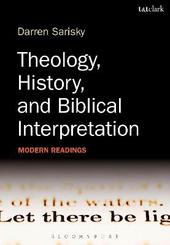
|
Theology, History, and Biblical Interpretation: Modern Readings
Paperback / softback
Main Details
| Title |
Theology, History, and Biblical Interpretation: Modern Readings
|
| Authors and Contributors |
By (author) Dr Darren Sarisky
|
| Physical Properties |
| Format:Paperback / softback | | Pages:504 | | Dimensions(mm): Height 244,Width 169 |
|
| Category/Genre | Biblical studies
Christian theology |
|---|
| ISBN/Barcode |
9780567459800
|
| Classifications | Dewey:230 |
|---|
| Audience | | Tertiary Education (US: College) | | Professional & Vocational | |
|---|
|
Publishing Details |
| Publisher |
Bloomsbury Publishing PLC
|
| Imprint |
T.& T.Clark Ltd
|
| Publication Date |
29 January 2015 |
| Publication Country |
United Kingdom
|
Description
The Christian Bible serves as the sacred scripture of the Christian community. It is read regularly by many people around the world today, as it has been for centuries. But how should one interpret this text? This reader presents a variety of perspective on how to relate historical and theological considerations when approaching the Bible. It encourages students and scholars to ponder how historical and theological categories shape one's view of three crucial realities: the text of the Bible, the human subject who reads the text, and the nature of the exchange between the two in the practice of reading. As historical and theological categories are applied to these realities, are they mutually exclusive, or can they be combined in some way? This reader encourages students and scholars to explore these important questions by bringing together a selection of some of modernity's most influential discussions of the issues as well as some of the present day's most distinguished attempts to weigh in on the debate.
Author Biography
Darren Sarisky received his PhD from the University of Aberdeen, UK. From 2009-2013, he was a Teaching Associate and then a Junior Research Fellow at the University of Cambridge, UK. He is now a Lecturer in Systematic Theology at King's College London, UK.
ReviewsThese extensive readings provide a wonderful resource for engaging biblical hermeneutics. Darren Sarisky's introductions are clear and concise, gently helping the reader to keep central questions in mind. Whatever one's inevitable quibbles over a text getting left out, these selections represent important moments of the modern conversation about theology and interpretation. Sarisky is one of the young scholars who can advance that conversation to a new stage, and here he does so by helping us attend to its historical context. * Daniel J. Treier, Wheaton College, USA * Theology, History and Biblical Interpretation is a collection of twenty seminal essays that, taken together, reflect the ebb and flow of historical vs. theological interests over the past two hundred years of biblical interpretation. Darren Sarisky provides a helpful editorial introduction and offers a broader perspective from which to see present-day controversies for what they are, namely, the latest chapter in the long story of the Bible, history, and theology in the modern world. This is a helpful collection of essays that convincingly demonstrates the importance of coming to grips with the meaning and relationship of historical and theological biblical interpretation. * Kevin Vanhoozer, Trinity Evangelical Divinty School, USA * Darren Sarisky's well-chosen and diverse collection of readings in the modern history of biblical interpretation shows that this is not the case. Biblical interpreters have engaged intensively with the history/theology problem for over three centuries, and Sarisky has done students and their teachers a great service by making such a broad range of major contributions to this debate available within a single volume * Francis Watson, University of Durham, UK * Since the Enlightenment, thoughtful readers of the Jewish and Christian Bibles have asked whether and how ancient scriptural texts, for all their historical particularity, might be or become the divine word. In this judicious selection of key voices in this debate, Darren Sarisky ushers the reader into this lively and ongoing conversation. The masters are all here, from Spinoza and Kierkegaard to Troeltsch and Ricoeur. Careful attention to these readings might save historical criticism from its thoughtless historicism, and theological interpretation from its ahistorical weightlessness, and resource a sophisticated dialogue between history and theology in the reading of the Bible today. * David Lincicum, University of Oxford, UK *
|